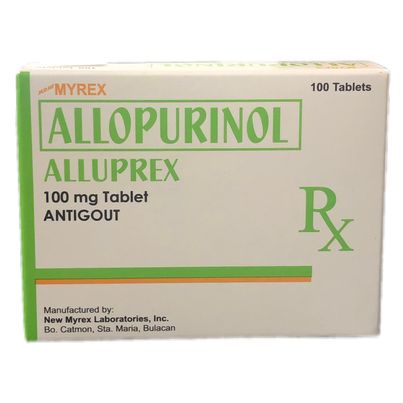Bambang Pharmaceutical Depot Inc.
Allopurinol (Alluprex) 100mg Tablet 100's
Allopurinol (Alluprex) 100mg Tablet 100's
Couldn't load pickup availability
Description:
Used to prevent or lower high uric acid levels in the blood. It is also used to prevent or lower excess uric acid levels caused by cancer medicines or in patients with kidney stones. A high uric acid level can cause gout or gouty arthritis (joint pain and inflammation).
Expiry: 01/2026
Product Description:
Allopurinol (Alluprex) 100mg Tablets are used to treat conditions associated with excess uric acid in the body, including gout and certain types of kidney stones. Allopurinol works by inhibiting the enzyme xanthine oxidase, which is responsible for the production of uric acid. By reducing uric acid production, Allopurinol helps prevent the formation of uric acid crystals in joints and tissues, thus reducing the risk of gout attacks and other complications related to hyperuricemia.
Each tablet contains 100mg of Allopurinol as the active ingredient. This product is available in bottles containing 100 tablets.
Key Features:
-
Active Ingredient: Contains 100mg of Allopurinol per tablet.
-
Effective in Gout: Allopurinol is the first-line treatment for gout and is used to reduce uric acid levels in the blood.
-
Prevention of Uric Acid Crystals: Helps prevent the formation of painful uric acid crystals in joints.
-
Treatment of Kidney Stones: Effective in treating and preventing the formation of uric acid kidney stones.
Indications:
Allopurinol (Alluprex) is primarily indicated for the treatment and prevention of:
-
Gout: A condition caused by excess uric acid in the blood, leading to the formation of uric acid crystals in the joints, causing inflammation, pain, and swelling.
-
Hyperuricemia: High levels of uric acid in the blood, which may be associated with conditions like gout or certain types of kidney stones.
-
Prevention of Uric Acid Kidney Stones: It is used to reduce the risk of uric acid kidney stones by lowering uric acid levels in the urine.
-
Chemotherapy-Induced Hyperuricemia: Used to prevent high uric acid levels due to chemotherapy treatments for certain cancers, particularly in patients undergoing cancer treatments that can increase uric acid levels, such as leukemia or lymphoma.
-
Lesch-Nyhan Syndrome: A rare genetic disorder that can cause uric acid buildup and may require treatment with Allopurinol.
Dosage:
The typical dosing of Allopurinol (Alluprex) depends on the condition being treated, as well as the patient's individual response:
-
Gout or Hyperuricemia:
-
Adults: Start with 100mg to 300mg daily, taken in one or divided doses, and adjust based on the individual’s response and uric acid levels. The dose may be gradually increased up to 800mg per day, depending on the severity of the condition.
-
The usual dose for maintenance is 200mg to 400mg daily.
-
-
Kidney Stones (Uric Acid Stones):
-
The typical dose ranges from 200mg to 300mg daily, depending on the specific patient needs and serum uric acid levels.
-
-
Chemotherapy-Induced Hyperuricemia:
-
The initial dose is usually 300mg to 400mg per day, depending on the severity of the condition.
-
Note: Always follow the exact dosage prescribed by the healthcare provider, as dosing may vary depending on the severity of the condition and the patient's response.
Administration:
-
Allopurinol should be taken with food to reduce the risk of gastrointestinal irritation.
-
Hydration: It is important for patients to drink plenty of fluids while on Allopurinol to help prevent kidney stones and maintain adequate urine output.
Side Effects:
Allopurinol is generally well-tolerated, but like any medication, it can cause side effects. Common side effects include:
-
Skin rash: This is one of the most common side effects. It may occur within the first few weeks of treatment and may be a sign of an allergic reaction.
-
Gastrointestinal disturbances: Nausea, vomiting, abdominal discomfort, and diarrhea.
-
Drowsiness: Some patients may feel tired or sleepy.
-
Headache.
-
Elevated liver enzymes: Mild increases in liver enzymes may occur but usually resolve with continued treatment.
More serious side effects, though rare, may include:
-
Severe allergic reactions: Symptoms like swelling of the face, lips, tongue, or throat, difficulty breathing (anaphylaxis).
-
Hepatitis: Inflammation of the liver, which may manifest as jaundice (yellowing of the skin or eyes), dark urine, or abdominal pain.
-
Stevens-Johnson syndrome: A rare but severe skin reaction, which can cause severe rashes, blisters, and peeling of the skin. This requires immediate medical attention.
-
Bone marrow suppression: Leading to conditions such as leukopenia (low white blood cell count) or thrombocytopenia (low platelet count).
-
Kidney issues: Symptoms of kidney problems, such as changes in urine output, may occur.
If any of these more severe side effects occur, it is important to contact a healthcare provider immediately.
Contraindications:
Allopurinol (Alluprex) should be avoided or used with caution in the following situations:
-
Hypersensitivity to Allopurinol: Do not use if allergic to Allopurinol or any of the ingredients in the tablet.
-
Acute Gout Attack: Allopurinol should not be started during an acute gout attack. It is typically used for long-term management and should only be initiated during the intercritical period (i.e., after the acute attack has resolved).
-
Severe Liver or Kidney Disease: Use with caution in patients with severe liver or kidney impairment. Dosing adjustments may be needed.
-
Pregnancy: Allopurinol should only be used during pregnancy if the potential benefit justifies the potential risk to the fetus. Always consult a healthcare provider before use.
-
Breastfeeding: Allopurinol is excreted in breast milk, so it should be used with caution in breastfeeding mothers, or alternatives should be considered.
Warnings and Precautions:
-
Skin Reactions: Rashes are a common side effect of Allopurinol, and severe rashes (such as Stevens-Johnson syndrome) can occur, particularly in the first few weeks of treatment. If a rash develops, stop the medication and consult a healthcare provider.
-
Renal Impairment: Since Allopurinol is excreted by the kidneys, it should be used with caution in patients with impaired kidney function. Dosage adjustments may be required.
-
Liver Function: Monitor liver function regularly, especially in patients with pre-existing liver conditions.
-
Dehydration: Adequate fluid intake should be maintained to reduce the risk of kidney stones and support renal function.
-
Gout Flares: Starting Allopurinol during an acute gout attack may worsen the flare. It is usually started during periods of symptom relief and may be accompanied by low doses of colchicine or NSAIDs to prevent flare-ups.
Pregnancy and Breastfeeding:
-
Pregnancy: Allopurinol is classified as Category C by the FDA for pregnancy. It should be used only when the benefits outweigh the risks. Consult with a healthcare provider before use.
-
Breastfeeding: Allopurinol is excreted in breast milk, so it should be used with caution during breastfeeding. Consult your healthcare provider to determine whether alternative treatments are preferable.
Drug Interactions:
Allopurinol (Alluprex) may interact with several other medications, including:
-
Azathioprine or Mercaptopurine: Allopurinol can increase the levels of these drugs, potentially leading to toxicity. Dosing adjustments are required when both drugs are used together.
-
Warfarin: Allopurinol may enhance the anticoagulant effect of warfarin, increasing the risk of bleeding. Close monitoring of the INR is advised.
-
Diuretics: Diuretics such as thiazides may increase the risk of Allopurinol-induced gout attacks, particularly in patients with pre-existing renal impairment.
-
Amoxicillin and Ampicillin: The use of Allopurinol with antibiotics like amoxicillin or ampicillin can increase the risk of rash.
-
Cyclophosphamide: The combination of Allopurinol and cyclophosphamide should be used cautiously, as it may enhance the toxic effects of cyclophosphamide.
Storage:
-
Store Allopurinol (Alluprex) 100mg Tablets in a cool, dry place, away from direct sunlight and moisture.
-
Keep the medication out of the reach of children.
-
Do not use past the expiration date printed on the packaging.
Conclusion:
Allopurinol (Alluprex) 100mg Tablets are an effective treatment for managing gout, hyperuricemia, and conditions related to high uric acid levels, such as kidney stones. By reducing uric acid production, it helps prevent gout attacks and the formation of uric acid crystals. Like all medications, Allopurinol can cause side effects and should be used with caution in certain populations. It is essential to follow the prescribed dosage and consult a healthcare provider for any concerns or adjustments, especially for those with kidney or liver issues, or those on other medications.
Share

Product Features
Highlights
Details
Lot #
Expiry Date
"For All Your Pharma And Medical Supply Needs"
-
MEDICINES
We offer large range of generics and branded tablets, capsules, topicals, suppositories, drops or suspensions, inhalers and injections.
-
SUPPLEMENTS
High quality yet very affordable vitamins and minerals, specialty supplements, herbals and botanicals, sports nutrition, and weight management.
-
MEDICAL SUPPLIES
We serve all types of medical supplies needed in clinics, laboratories, and hospitals like cottons, gauze, alcohol, swabs, gloves, bandages, lancets, glucometer, etc.
-
MEDICAL EQUIPMENT
We also serve durable and affordable medical devices and equipment needed in clinics, laboratories and hospitals.
Subscribe to our emails
Be the first to know about new collections and exclusive offers of Bambang Pharmaceutical Depot Inc.


